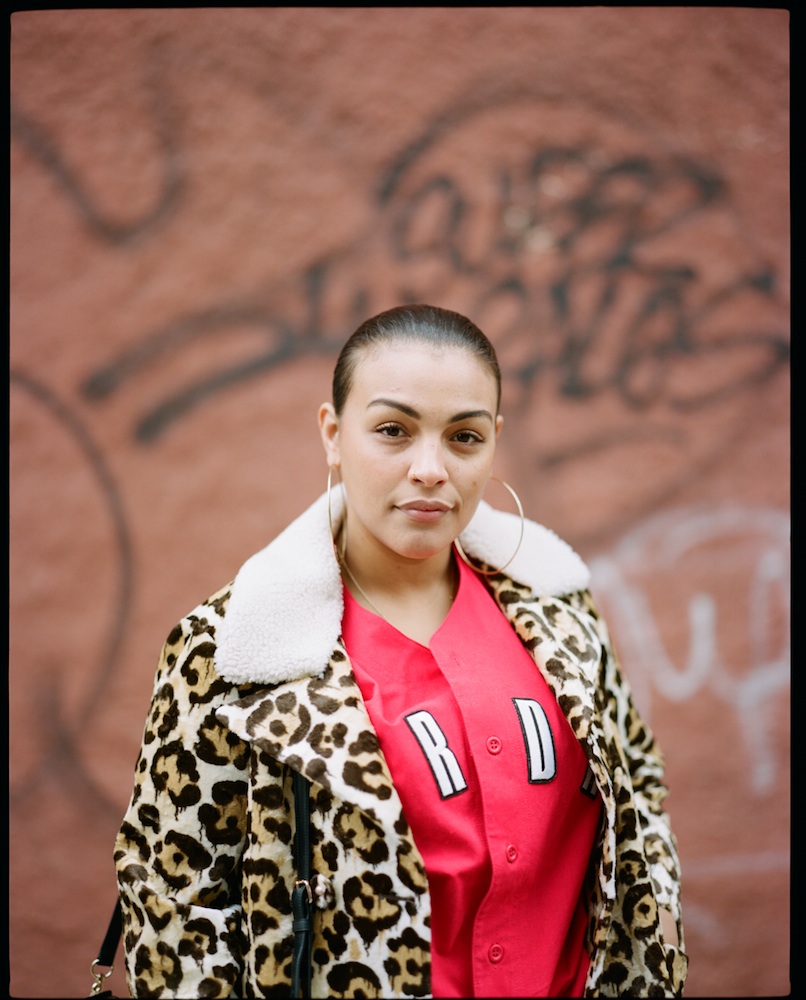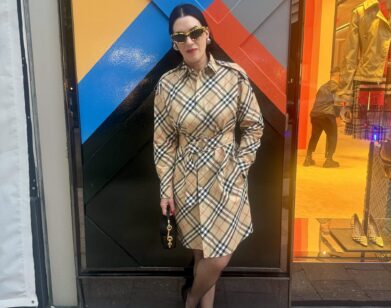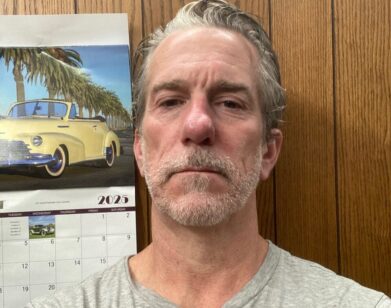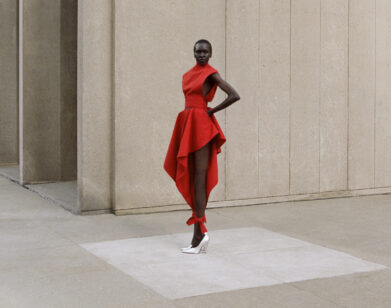Paloma Elsesser

ABOVE: PALOMA ELSESSER IN NEW YORK, MARCH 2015. PHOTO BY TEDDY FITZHUGH. WILD BEAST SHORT PEACOAT: COACH
As a young girl growing up in Los Angeles and as a minority in private schools, Paloma Elsesser faced judgments against her body throughout the years. Now, however, she has embraced her body and even become widely known for her empowering persona, amassing more than 21,000 followers on Instagram by posting unfiltered selfies and chronicling her daily life. Frequently sporting laid-back looks (including plenty of hoodies, topknots, and hoop earrings), Elsesser offers an escape from feeds often filled with overly edited iPhone photos. As such, she has earned herself previous comparisons to snapshots of Chloë Sevigny from her Kids era and a pre-millennium J.Lo.
It is only fitting that in the photo above Elsesser chooses to wear the Wild Beast Short Peacoat from Coach’s Spring/Summer 2015 collection, which draws heavily upon American iconography. Like Elsesser’s comparisons to Kids (1995), Coach Creative Director Stuart Vevers found inspiration in Quentin Tarantino and Tony Scott’s True Romance, another cult ’90s film that also stars a blonde with a bob. When paired perfectly with Elsesser’s own jersey top, the jacket and overall outfit reflect both her own sensibilities as well as Vevers’ nostalgia-infused collection.
Just before the photo was taken, and a week before the now 23-year-old’s birthday, we spoke with Elsesser about school, growing up, and finding herself.
EMILY MCDERMOTT: I know you’re studying psychology and literature. What made you want to study those two topics?
PALOMA ELSESSER: I originally went to school for writing, for non-fiction. I’m specifically a poetry major within literature, but I don’t know… I love to write and when I first went into school I had the intention of it being a life long profession. In my first year I had to get psychology electives, I had to get liberal arts credits, and I realized that I really connected with all the things they were talking about. It became quite easy for me. The more and more I got into writing, the harder and harder it became for me. I still love it, but it became much more problematic than I thought it would be.
MCDERMOTT: In what ways did it become problematic? That’s interesting that the more interested you became, the harder it was.
ELSESSER: I think I got harder on myself and more aware. For instance, in my first year, in my non-fiction classes, we would do critiques and reviews of other peoples’ work. I felt like, especially at the New School, there’s a lot of well-off white people, to be quite frank. So the topics that I was trying to discuss—not that writing is supposed to be relatable—but I felt very isolated and started to judge myself more and be more self conscious in ways that I wasn’t before. I was like, “If I feel this way in a critique or in a class with a lot of privileged white kids, how am I going to feel in New York City writing in a country of privileged white people?” You know what I mean?
Initially, writing was my immediate outlet, and I still love to write, but I think I’ve also taken the pressure off of it because ultimately, when I’m done with school, I’m going to get my masters in psychology. I’ll go into clinical work. While trying to write, I found psychology was such an outlet for me. I love kids, learning about developmental things, and stuff like that, so I think it started to make more sense in the end.
MCDERMOTT: What are you reading right now?
ELSESSER: Right now I’m taking a Freud class and my teacher is so captivating. She’s a psychoanalyst. I’m like, “You’re so fucking smart, I want to be you, I think I’m in love with you.” She wrote a book with her husband about Hamlet and these connections with psychoanalyst and biblical standpoints on Shakespeare, so I’m reading that.
MCDERMOTT: Soon after you first moved to New York, you took two years off. What was it like moving and then what made you go back to L.A.?
ELSESSER: I went to small liberal schools my whole life and I was also a bad girl in high school; I went to, like, five schools. Most of the colleges I applied to were small and would be conducive to the person I am [and] were all on the East Coast. I couldn’t imagine going to UCLA, or Santa Cruz; it seemed impossible. I decided that I didn’t want to go somewhere where I felt like I’d be the coolest person there. I felt like I’d rather be somewhere where if I don’t fuck with people at my school, there’s a whole city for me to feel attached to and moved by.
I had just turned 18 when I moved here, and I was also still in a party scene. Then my sophomore year—I’ve always struggled with depression and other things like that—I had to get my shit together. I went to treatment and I had to go back to L.A. to be with family. It was a really important time for me; I grew more than I could have imagined. Being bound to the confines of my mom’s house with no car, I was newly sober, I didn’t have that many friends—that’s the kind of shit that makes you grow… I was like, “I’m just going to go back to L.A. for like five, six, months,” but it took me two years. So I got it together, saved a bunch of money, moved back, couched surfed, been sober since, and now I have my own apartment. It’s the little things. If I hadn’t gone back to L.A., I wouldn’t be in New York, period.
MCDERMOTT: What was one of the most important things you learned about yourself doing those two years?
ELSESSER: I feel like I learned who I was more than anything. I started drinking when I was fairly young. I grew up L.A., it’s not like life in the fast lane, but kids get fucked up early. I went to private school with really affluent, privileged people, and partying was my identity and what I was about. All these things that were so external were who I was. I was like, “I don’t know if I’m fun, I don’t know if I’m funny, I don’t know if I’m personable.” When you extract the alcohol and the partying, I was unsure. But within that time I realized that I was still very much that person; I can whole-heartedly be like, “I love people and it’s not just being drunk.” I’m 22 now and I feel like I’ve jumped a lot, so I’m really grateful for that. I’m like, “When I turn 23 I should be blackout, fucking somebody I don’t know on my birthday,” but I’m really grateful that’s not happening. [laughs]
MCDERMOTT: How do you think New York has influenced you opposed to L.A.?
ELSESSER: New York has influenced me a lot in terms of my own independence. I’m really struck by the idea of authenticity and I think New York embodies that idea, even though people are like, “I miss the old New York.” But at its core, it has this natural authentic energy. L.A. lacks that idea; it’s painted over. The struggles of New York and the struggles of day-to-day and the little things that you see are so true and authentic. While in L.A., the shine is almost abrasive; it’s intrusive. I just think [New York] is a really authentic place and I love it for that.
MCDERMOTT: Going with the idea of authenticity and connecting with people—I know you’re following on social media is rather large. How do you feel about that and it being an authentic representation or connection?
ELSESSER: It’s not that hard for girls to have followers—I think I’m a pretty girl and I also represent a different kind of pretty girl. I represent a whole group of women and girls that for years hadn’t been represented and are now being more valued. I think I get that attention because of that and because of the growth of fashion. People get paid so much money to be marketing and branding experts, and the secret is to just be consistent. I represent my interests, but I also withhold certain things because it doesn’t fit. I don’t find it inauthentic, I just also like to keep things for myself. A follower or a girl who I’ll connect with is the most important thing for me.
I never imagined myself being a role-model, and I think that’s the most valuable, authentic part. I’m super about girl-power—I love women, I love girls. I think femininity is so beautiful. I didn’t intend, through Instagram or social media, to be like, “I want to be a role-model and I want all girls who aren’t skinny to lookup to me,” but it just happened.
MCDERMOTT: How did you first become interested in representing these ideas of femininity?
ELSESSER: My parents were super spiritual and open, and my mom, I see her as a goddess. Of course, when I was 15, I was like, “You’re a bitch!” but as I got older I saw what womanhood was and that it’s hard to be a girl and it’s hard to be a person in general. I grew up with a lot of women that I respected and loved. I just always thought women and girls older than me were so cool. I’m always in awe of the things that women do in the day-to-day.
MCDERMOTT: Who are some of your biggest role models?
ELSESSER: My mom. It sounds pretty corny, but I love her. She teaches me so much about being a human being. My mom’s my number one supporter. She also took me around the world on her back, and, in general she is super educated.
She was a dancer and traveled the world. She’s always like, “Don’t feel held down to one place. Don’t be so hard on yourself.” Overall, our pathologies are completely different, but it’s so important having someone like that. She’ll send me inspirational texts like, “You are a powerful being in the world!” Some parents judge—my friends’ parents judge them—but my mom never judged me and I always know she’s there for me. That’s something really beautiful, I think.
MCDERMOTT: I’ve read that you’re a model, that you’re a writer, but when you look at yourself, how would you describe you?
ELSESSER: I’m also in a weird week of life thinking about that. I’ve been going to sleep every night like, “What am I going to do?” [laughs] Right now, in this moment, I’m pretty humbled. I’m a student and a waitress; I work at Miss Lily’s, which I love—it’s a Jamaican restaurant—but I guess I’m a model… I get paid to have my picture taken. I still write; I get paid to write sometimes. So I don’t know. I think I’m still figuring it out to be honest with you. Every week it’s different.
MCDERMOTT: If you had to give one piece of advice to the people that look up to you or know you, what would that be?
ELSESSER: Listen to yourself and look at yourself. The most important thing for me is to be as introspective as possible—but don’t look at yourself in a judgmental way. It’s radical acceptance.
For more from this series, click here.






